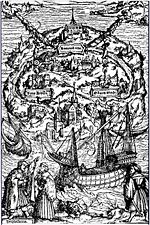Utopia: Difference between revisions
imported>Derek Hodges No edit summary |
imported>Derek Hodges (added image) |
||
| Line 1: | Line 1: | ||
{{subpages}} | {{subpages}} | ||
{{Image|Utopia.jpg|right|150px|Woodcut by Ambrosius Holbein for the 1518 edition of Thomas More's Utopia}} | |||
"A map of the world that does not include Utopia is not worth even glancing at." --[[Oscar Wilde]] | "A map of the world that does not include Utopia is not worth even glancing at." --[[Oscar Wilde]] | ||
Revision as of 18:08, 24 February 2010
"A map of the world that does not include Utopia is not worth even glancing at." --Oscar Wilde
Utopia is the name of a fictional society created by Sir Thomas More as a satire on his own, European, society; by extension, it has come to represent all ideal societies, real or imagined. There have been many fictional utopias created before and after More's 1516 book; it can safely stated that there has never been a true utopia in the real world. The name Utopia is generally taken to have been formed from the ancient Greek οὐ, "not", and τόπος, "place" as can be seen in later literary utopias such as Samuel Butler's Erewhon (nowhere written backwards) and News from Nowhere by William Morris. It can also be taken as beginning with εὖ, "good".[1]
References
- ↑ Atwood, Margaret (2007-11-16). Margaret Atwood on Brave New World. Retrieved on 2010-02-24.
